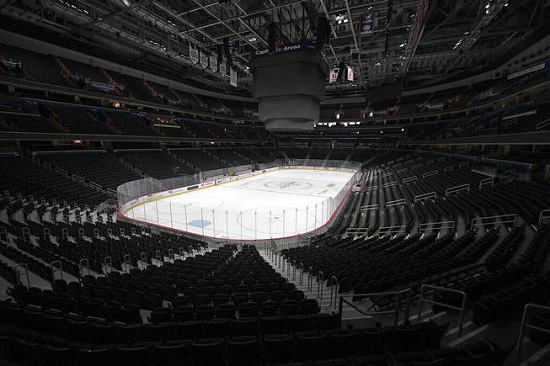Breaking News: Multiple Owners Suggest League Should Consider Skipping 2020-21 NHL Season

The NHL has been working hard on developing plans for the 2020-21 season, but there is reportedly disagreement about whether it is worth it at all for next season.
According to Emily Kaplan and Greg Wyshynski of ESPN, multiple owners have argued the NHL will be “better off financially if it shuts down next season” instead of playing in empty arenas as a result of the COVID-19 pandemic.
Commissioner Gary Bettman has reportedly disagreed with this mindset, claiming that would do more long-term damage to the sport similar to the result of lockout seasons.
Though there could still be a shortened season, league sources reportedly believe 48 games will represent the “absolute minimum.”
The NHL and the NHL Players’ Association announced on Oct. 6 that they have shifted their target date for starting the 2020-21 season to Jan. 1, 2021, after initially targeting Dec. 1.
“It’s premature to be drawing up plans [when] you don’t have a real good idea as to whether they’re practical, feasible or going to be put in place,” NHL deputy commissioner Bill Daly told ESPN last week. “At some point, we have to do it. But I think to this point, it’s been the general sentiment that we don’t know enough yet to get more granular than we’ve been.”
The mantra from NHL commissioner Gary Bettman has been that the 2020-21 season doesn’t necessarily have to end the way that it begins. The subtext to that: The NHL fully intends to have fans back in its home arenas at some point this season.
“I think the ultimate goal is to end up with fans in the arenas. I don’t think we’ll get to capacity, but I think we’ll have enough socially distanced fans,” said an NHL source.
Empty arenas and additional lost revenue could be a significant concern for the NHL after the pandemic caused massive changes to the 2019-20 season. After the league paused action in March, it resumed more than four months later with a modified postseason in two bubbles—in Edmonton and Toronto—that ended with the Tampa Bay Lightning winning the Stanley Cup in September.
Bettman has previously said game-day income accounts for about 50 percent of total revenue for the NHL, via Sports Business Daily.
The “ultimate goal” of the 2020-21 NHL season is to eventually get teams back in their own arenas, playing in front of their fans, especially for the playoffs. When and how that happens is the question, and it might not be a question answered before the season starts.
The NHL at the very least wants spectators for the Stanley Cup playoffs, which would return to the usual 16-team format after 24 teams made the postseason last year.
“We want to make it as traditional a tournament as we possibly can,” deputy commissioner Bill Daly said. “We want to maintain the competitive integrity of the playoffs, for sure.”
Venues are already booking concerts and events for the spring and summer — why not for hockey?
According to several sources, a few owners have suggested to Bettman that the league might be better off financially if it shuts down next season, since playing in empty arenas could be crippling to the bottom line. The NHL is still very much a gate-driven league in comparison to a league like the NFL, which draws most of its revenue from media rights. Bettman responded that the NHL can’t lose a season because it’s too damaging in the long term, as the league has learned before in lockout seasons. So it’s a safe bet that there will be some version of the NHL next season, though it’s going to look different than what we’re used to.
The NHL allowed teams to begin opening their training facilities for voluntary workouts on Oct. 15. However, there is a 19-page document of protocols that takes into account social distancing as well as increased health and safety measures. A team needs notice from at least five players before reopening its facilities for voluntary workouts, and a maximum of 12 players can be on the ice at the same time.
Players and staffers who participate in voluntary offseason workouts are tested for COVID-19 at least twice weekly. Anyone who has had COVID-19 must also undergo a cardiac screening. As of this week, roughly half of the league’s teams have opened their training facilities.
There are still clearly a lot of moving parts and nothing has been finalized for the upcoming season, only featuring a target date of Jan. 1, 2021, and a goal to complete the season by July 1st before the Tokyo Olympics begin.
